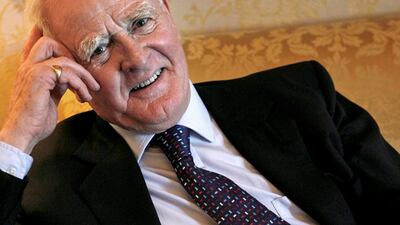On Saturday, John le Carre, the most celebrated spy fiction writer of his time, died from pneumonia at the age of 89. Le Carre, whose real name was David Cornwell, had been publishing novels on subjects ranging from the Cold War to the Middle East for almost 60 years. In a tweet yesterday, American novelist Stephen King wrote that 2020 has claimed a "literary giant and a humanitarian spirit".
This designation of Le Carre as a humanitarian comes from the latter's realistic, often critical assessment of the work of modern intelligence agencies. His writing also acted as a counterbalance to a more romanticised brand of spy fiction, often associated with Ian Fleming, author of the James Bond stories. While Fleming wrote from the Caribbean, Le Carre used his personal experience of the drab, grey intelligence arena of post-War Europe. In Fleming's novels, stories focused on the charm and romanticism of James Bond, equally gifted at defeating caricature villains as he was at charming women. For Le Carre, largely unremarkable protagonists fitted into nebulous intelligence networks, often without any sense of moral purpose.

This lost Le Carre friends in the British intelligence establishment. Having worked in both MI5 and MI6, the UK's domestic and foreign intelligence arms, former colleagues felt betrayed by his pessimistic portrayal of their work. But his career and personal life - Le Carre's father was a conman who was arrested numerous times - made him well placed to articulate the moral ambiguity of such murky worlds.
In later writing, as Cold War tensions diminished, his focus turned in part to the Middle East. His 1983 novel The Little Drummer Girl looked at Israeli spy agencies in the Palestine-Israel conflict. He was particularly critical of the US-led "War on Terror", a topic he explored in novels such as Absolute Friends and A Most Wanted Man. His 2003 essay in The Times, entitled "The United States has gone mad", was a rebuke to then US president George W Bush and UK prime minister Tony Blair. He described Mr Bush's notion that Iraqi dictator Saddam Hussein was responsible for the 9/11 terror attacks on US soil as "one of the great public relations conjuring tricks of history", potentially more disastrous than the Vietnam War. He also had the foresight to see that US reactions to 9/11 were "beyond anything Osama bin Laden could have hoped for in his nastiest dreams", and that they were eroding freedoms that had made "America the envy of the world".
His focus on realistic portrayals of espionage puts him at the top of his genre - Graham Greene said Le Carre's The Spy Who Came in from the Cold was "the best spy novel I have ever read". It also continues to inspire the genre today, with hugely popular series such as the French programme Le Bureau des Legendes choosing, like Le Carre, to centre stories in reality, not fantasy. Most importantly, Le Carre will be remembered for a lifetime's work that gives the public an accessible but important stake in some of the most secretive corners of today's world.


